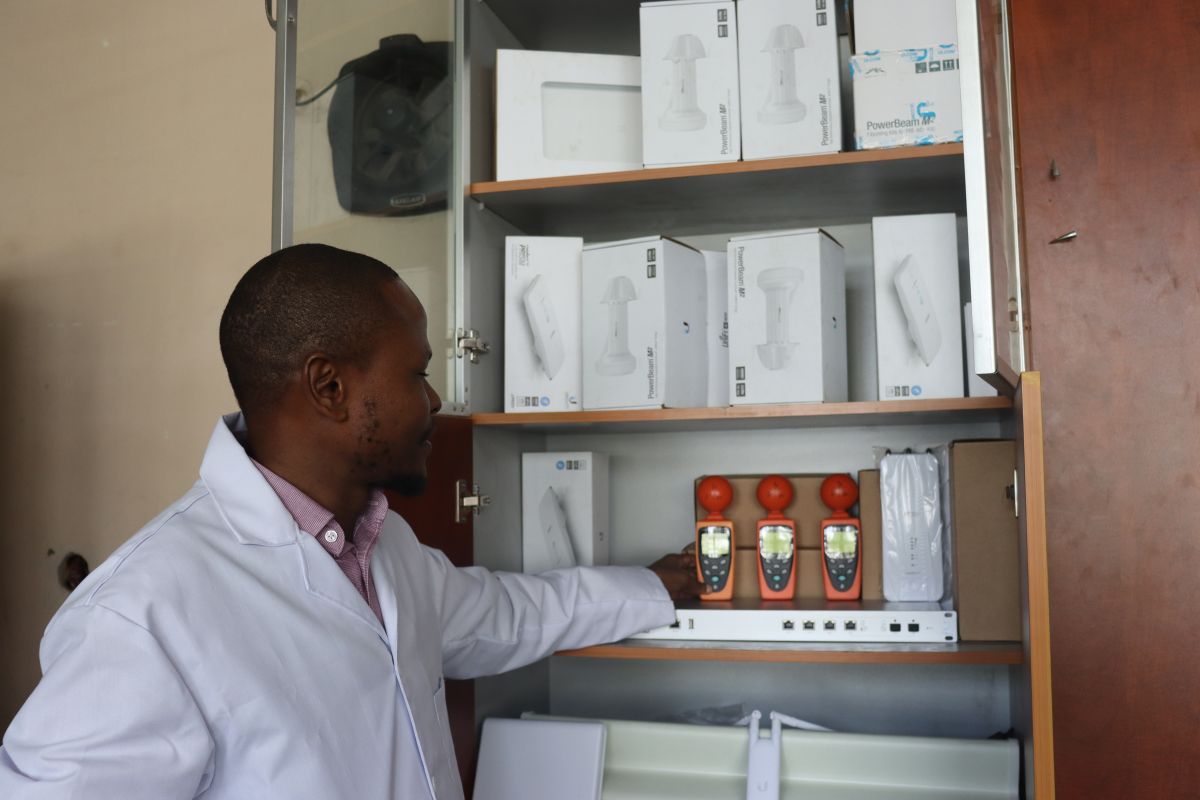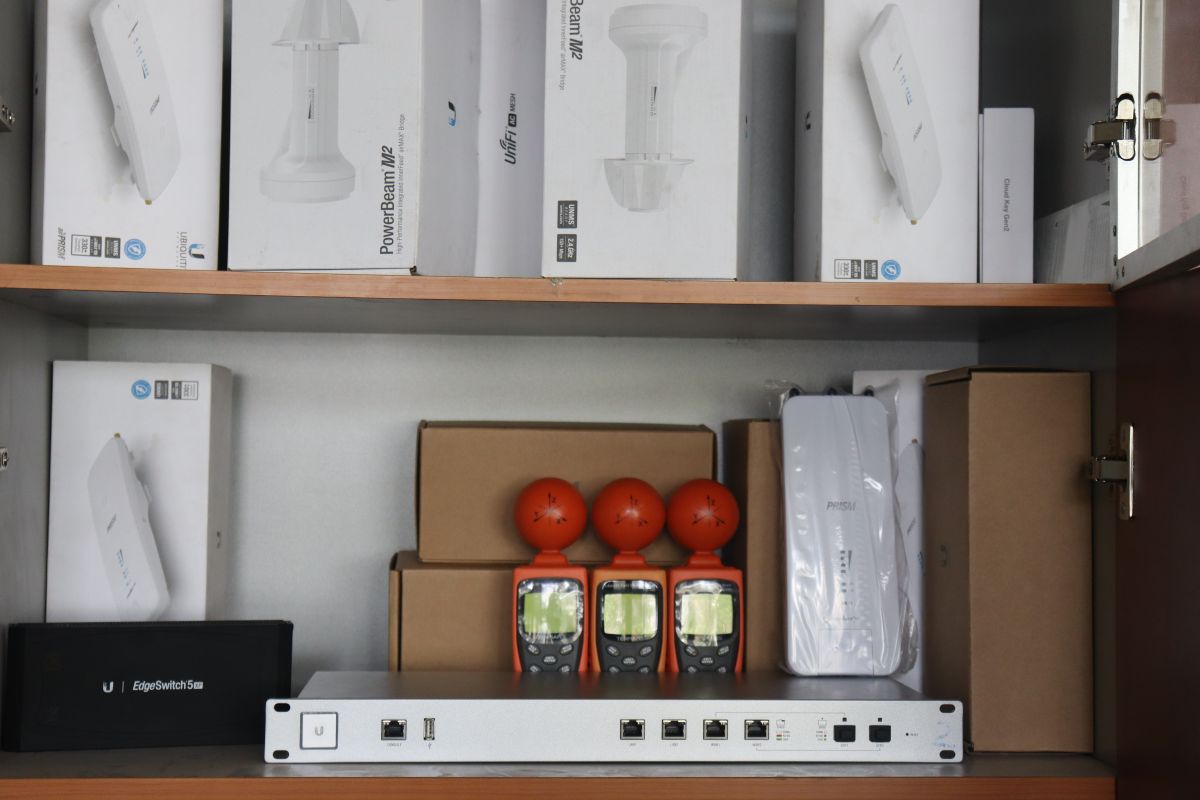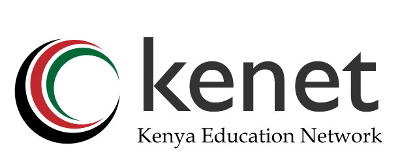You are here
Dr. Akuon, CSIS Grantee : "RF Radiation Activity of Mobile 2G, 3G, 4G, 5G+, Wi-Fi around the Human Body"
One of KENET's mandates as an organization is to catalyze collaboration in research and education areas through facilitation of special interest groups (SIGS) and provision of innovation grants to researchers and member institutions.
In 2019, KENET awarded a total of $60,000 Computer Science, Information Systems and Engineering Multi-Discplinary grant to four (4) research projects in the areas of Internet of Things (IoT) in Agriculture and Health. The grants were awarded to the four (4) lead researchers and extended to 15 other researchers ( team members) to the projects from six (6) universities, three (3) government institutions and one (1) research institute.
Dr. Peter Akuon, a Senior Lecturer, Department of Electrical and Information Engieering from University of Nairobi was amonf four (4) lead researchers who were awarded the KENET Multi-Discplinary Mini Grant. Other team members (researchers) included; Dr Lemy Oginga (GP-Ministry of Health), Col. Andrew Nyawade (Ministry of Defence) and Mr. Tom Oloo (Senior Technologist - University of Nairobi).

Dr.Akuon explaining the use of the Electromagnetic field meters (EMF meters)
Research Findings
The research which was in the area of Internet of Things (IoT) in Heakth was titled "RF Radiation Activity of Mobile 2G, 3G, 4G, 5G+, Wi-Fi around the Human Body". (https://emf-health.uon-powernet.com/SAR_simplified.php)
The research aimed at investigating the radioactivity levels in the environment. The team collected data within the Kenyan environment using Electromagnetic field meters (EMF) meters to analyse safety of the Kenyan environment. Wireless communication requires the use of frequencies from an antenna. Power is used to send a signal in form of energy from the sender's device to the receiver changing the energy in the environment which in turn maybe harmful to animal life as different frequecnies carry different energy amounts.
Due to different trasnmissions from several wireless communication providers, the sum of the enrgies in the environment may go to harmful levels past the safety levels of 2W/kg according to the standards provided by the World Health Organization. Information on radio activity levels in the environment was lacking for the Kenyan environment by the time the team was conducting the research in 2019.
The research was further motivated by the suspicion that Covid 19 was caused by radio waves. In December 2019, there was an experiment for wireless communication in China that utilized a frequecy (60ghz) to do the experiment. At this frequency, oxygen molecules get very highly energized, and this was related to the breathing problems caused by Covid 19.
The research has provided widespread available data on Wireless Radiation Activity levels collected about the Kenyan environment in terms of wireless communication. Based on the data collected, it was established that the Kenyan environment is safe, and a community calculator was developed to check the safety of their environment and the devices being used and the results updated online.
Over 20 Undergraduate students involved in the environment gained theoretical and hands on knowledge and skills on how to assess existence of environmental hazard from wireless communication and are also able to train and share this knowledge with others.

Electromagnetic Field meters (EMF meters)
Further funding
By undertaking this research project, the team attracted further funding of up to Kshs 3M from the Royal Academy of Engineering to purchase WiFi equipment and for development of the phototherapy machine based on safe radiation levels. The WiFi equipment was installed at the Mamlaka students'hostels at the University of Nairobi. Equipment installation in other areas is ongoing. Currently, the development of the phototherapy machine by the Department of Electrical and Information Engineering (University of Nairobi) based on the learning achieved from the project is ongoing.
Published Papers
Four (4) papers have been presented by undergraduate students in an internal conference of the University of Nairobi. The team will also prepare a policy brief based on the project research findings to be shared with relevant stakeholders.
Dr. Akuon encouraged other researchers to apply for the KENET Mini grant as it provides a platform which didn't exist before researchers in Kenya. He also recommended that award of the mini grant eligibilty conditions include the requirement that the principal investigators applying for the grant should have a collaborator from another institution. "As a national grant, this would bridge the research capacity gap among the various research institutions and also develop other institutions' research capacity thus increasing the impact of the grant, " said Dr. Akuon.
The other grantee teams were;
a. Jomo Kenyatta University of Agriculture and Technology team led by Dr. Evan Wanjiru. The project title was "Monitoring and predicition of domestic animals' health using internet-of-things (IoT) technologies"
b. Moi University team led by Dr. John Tarus. The project title was "Black Tea Fermentation Monitoring Model based on IoT and Image Processing Techniques
c. The University of Nairobi team led by Dr. Peter Akuon. The project title was "RF Radiation Activity of Mobilr 2G, 3G, 4G, 5G+, Wifi around the Human Body"
d. United States International University - Africa team led by Dr. Stanley Githinji Muturi. The project title was "Smart Monitoring of Water Quality for Urban Irrigation and Domestic Supply by Exploiting IoT in Nairobi River.
As of June 2023, the operational SIGs were in the academic areas of Computer Science & Information Systems (CSIS), Engineering and Computational Modelling & Material Science (CMMS). The SIGs form the backbone of enhancing research capacity development in key areas that will forster innovation and technology in the KENET community.
KENET innovation grants are mainly awarded to early career faculty teams to spur research & education collaboration among member institutions in addressing current and emerging issues to expand the community of researchers. Through these innovation grants, KENET hopes to not only support individual research teams, but to facilitate institutional collaboration and formation of communities of practice in the research areas of focus leading to enhanced research capacity in member institutions.
